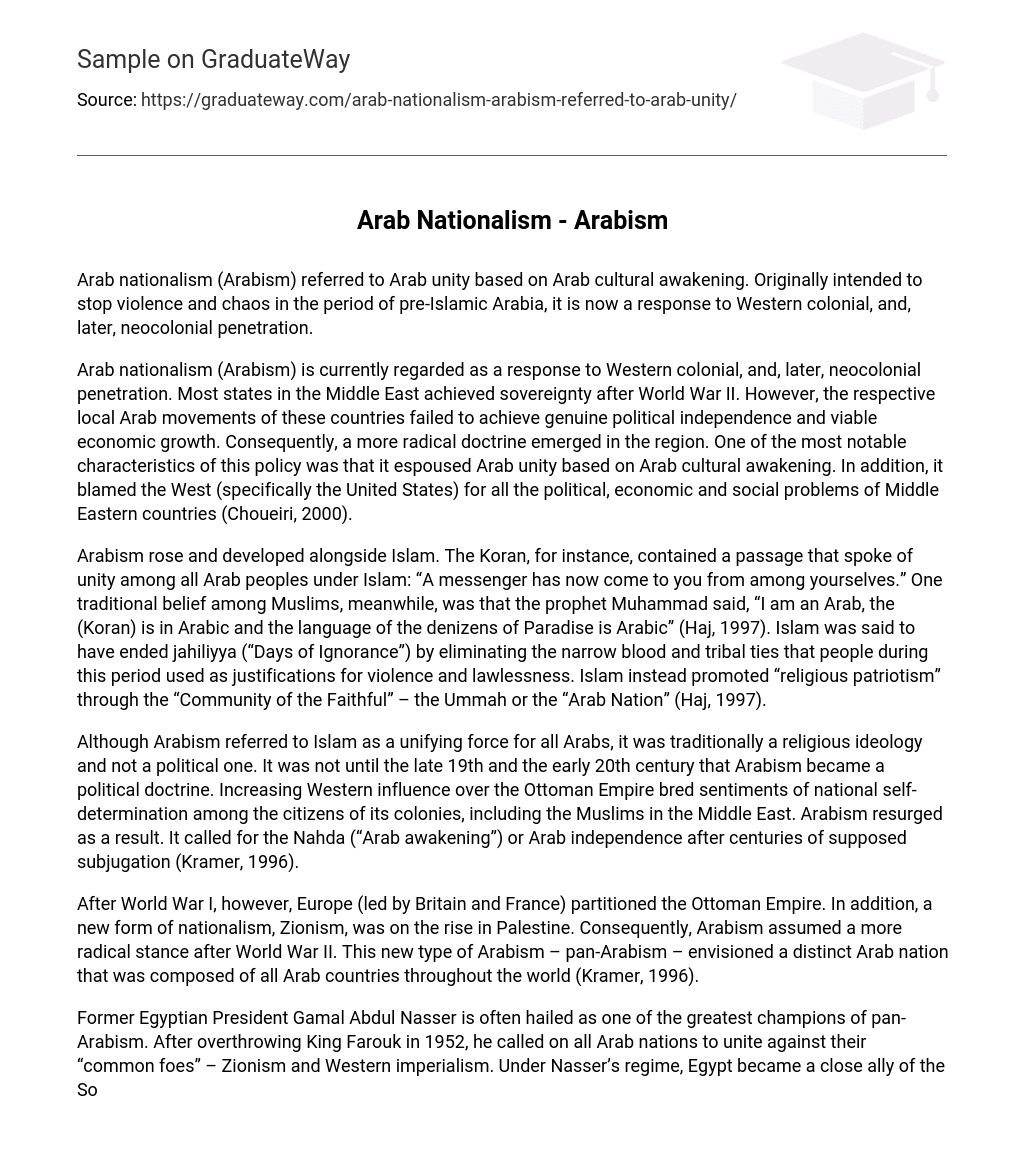Arab nationalism (Arabism) referred to Arab unity based on Arab cultural awakening. Originally intended to stop violence and chaos in the period of pre-Islamic Arabia, it is now a response to Western colonial, and, later, neocolonial penetration.
Arab nationalism (Arabism) is currently regarded as a response to Western colonial, and, later, neocolonial penetration. Most states in the Middle East achieved sovereignty after World War II. However, the respective local Arab movements of these countries failed to achieve genuine political independence and viable economic growth. Consequently, a more radical doctrine emerged in the region. One of the most notable characteristics of this policy was that it espoused Arab unity based on Arab cultural awakening. In addition, it blamed the West (specifically the United States) for all the political, economic and social problems of Middle Eastern countries (Choueiri, 2000).
Arabism rose and developed alongside Islam. The Koran, for instance, contained a passage that spoke of unity among all Arab peoples under Islam: “A messenger has now come to you from among yourselves.” One traditional belief among Muslims, meanwhile, was that the prophet Muhammad said, “I am an Arab, the (Koran) is in Arabic and the language of the denizens of Paradise is Arabic” (Haj, 1997). Islam was said to have ended jahiliyya (“Days of Ignorance”) by eliminating the narrow blood and tribal ties that people during this period used as justifications for violence and lawlessness. Islam instead promoted “religious patriotism” through the “Community of the Faithful” – the Ummah or the “Arab Nation” (Haj, 1997).
Although Arabism referred to Islam as a unifying force for all Arabs, it was traditionally a religious ideology and not a political one. It was not until the late 19th and the early 20th century that Arabism became a political doctrine. Increasing Western influence over the Ottoman Empire bred sentiments of national self-determination among the citizens of its colonies, including the Muslims in the Middle East. Arabism resurged as a result. It called for the Nahda (“Arab awakening”) or Arab independence after centuries of supposed subjugation (Kramer, 1996).
After World War I, however, Europe (led by Britain and France) partitioned the Ottoman Empire. In addition, a new form of nationalism, Zionism, was on the rise in Palestine. Consequently, Arabism assumed a more radical stance after World War II. This new type of Arabism – pan-Arabism – envisioned a distinct Arab nation that was composed of all Arab countries throughout the world (Kramer, 1996).
Former Egyptian President Gamal Abdul Nasser is often hailed as one of the greatest champions of pan-Arabism. After overthrowing King Farouk in 1952, he called on all Arab nations to unite against their “common foes” – Zionism and Western imperialism. Under Nasser’s regime, Egypt became a close ally of the Soviet Union (the latter supplied Egypt with weaponry through the Czech-Egyptian arms deal of 1995) and the Suez Canal was nationalized (July 1956). His government also obtained the support of India, China, Indonesia and Yugoslavia. Despite immense local and international opposition, Nasser managed to stay in power for 18 years until his death on September 28, 1970 (Brown, 1984).
Despite his reputation as one of the foremost pan-Arabic figures, Nasser “gave pan-Arabism…its tragic end in 1967” (Ajami, 1992). Egypt’s defeat to Israel in the Six-Day War (June 5-10, 1967) was said to be the end result of the shortcomings of the Nasserite administration (Rabinovich and Shaked, 1978). Prior to the Six-Day War, Egypt plunged its economy into bankruptcy by waging costly wars with Syria and Yemen. Egypt’s loss in the Six-Day War, therefore, reflected the shallowness of pan-Arabism. While pan-Arabism can generate popular support by capitalizing on nationalistic fervor, it was not enough to bring peace and stability to a country (Ajami, 1992).
Another effect of Egypt’s defeat in the Six-Day War is that it divided Arab leaders into those who finally adopted Western political and economic models and those who continued to embrace the rhetoric of messianic governments. Leaders such as Mohammad Reza Shah Pahlavi of Iran, King Hussein of Jordan and King Faisal of Saudi Arabia exemplified the former, while Ayatollah Ruollah Khomeini of Iraq and Muammar Abu Minyar al-Gaddafi of Libya comprised the latter.
Because of the aforementioned divide, the idea of interdependence among Arab countries was rendered almost impossible. Furthermore, the triumph of the Iranian Revolution in 1979 introduced the concept of “political Islam.” After Khomeini overthrew the Shah, Arabism became synonymous to the establishment of Arab states that are based on the sharia (Islamic law). Countries such as Algeria, Morocco, Lebanon, Turkey and Afghanistan followed suit – the success of the Iranian Revolution made them view Islam as the only solution to the poverty, corruption and disorder that Western political and economic models allegedly caused them. At present, “political Islam” is still the basis for the ideology of terrorist groups such as the Al-Qaeda and the Hezbollah (MSN Encarta, 2008).
Arab nationalism or Arabism was originally a path to peace unity. The prophet Muhammad came up with it in order to stop the carnage that was very rampant in pre-Islamic Arabia. During the time of the Ottoman Empire, progressive Arabs used Arabism as a means of inspiring their fellow citizens to join in their struggle for independence. But Arabism gained its current notoriety when it was used as a justification for mindless violence. Under the guise of “unity among all Arab nations,” senseless wars were waged while the real causes of division – conflict due to poverty and corruption – were left unresolved.





